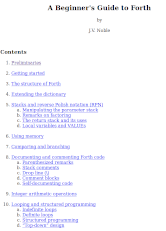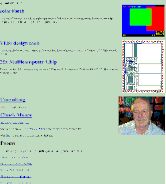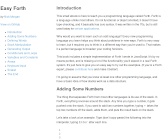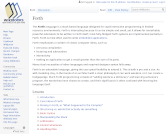5. A Beginner’s Guide to Forth by J.V. Noble
 The Forth programming language is radically different from conventional programming languages. It bears little resemblance to C, Java, Pascal, Lisp, Python, etc. This short article will not attempt to teach you the Forth language, but instead give you a taste of what Forth has to offer, give you a general idea of what the language is, and point you in the direction of various Forth resources.
The Forth programming language is radically different from conventional programming languages. It bears little resemblance to C, Java, Pascal, Lisp, Python, etc. This short article will not attempt to teach you the Forth language, but instead give you a taste of what Forth has to offer, give you a general idea of what the language is, and point you in the direction of various Forth resources.
This primer was written in the hope that it will be useful and that starting Forthers aren’t put off by the high price of Forth textbooks.
6. Thoughtful Programming and Forth by Jeff Fox
 In this world there are few people working on making computers simple to understand, simple to build, and simple to program. There are few people making programs that are easy to understand, easy to maintain, efficient and beautiful. One of those people is Charles Moore the inventor of the computer language Forth. Chuck Moore describes himself as a professional who gets personal satisfaction out of seeing a job done well.
In this world there are few people working on making computers simple to understand, simple to build, and simple to program. There are few people making programs that are easy to understand, easy to maintain, efficient and beautiful. One of those people is Charles Moore the inventor of the computer language Forth. Chuck Moore describes himself as a professional who gets personal satisfaction out of seeing a job done well.
This document is not intended to be a programming tutorial. It is not going to present a step by step explanation of how one programs in the style that Chuck Moore is using but will present an overview of what he is doing and why.
7. Easy Forth by Nick Morgan
 This small ebook is here to teach you a programming language called Forth. Forth is a language unlike most others. It’s not functional or object oriented, it doesn’t have type-checking, and it basically has zero syntax. It was written in the 70s, but is still used today for certain applications.
This small ebook is here to teach you a programming language called Forth. Forth is a language unlike most others. It’s not functional or object oriented, it doesn’t have type-checking, and it basically has zero syntax. It was written in the 70s, but is still used today for certain applications.
This book includes a simple implementation of Forth written in JavaScript, making it easy to try writing small Forth programs.
8. Forth by Wikibooks
 Chapters cover:
Chapters cover:
- Introduction.
- Core ideas of Forth.
- Parsing in Forth, or “What happened to the Compiler”.
- Structuring vs. words that actually do something.
- Basic Syntax.
- Manipulating the Stack.
- Arithmetics.
- Control Structures.
- Handling Files.
Pages in this article:
Page 1 – Thinking Forth and more books
Page 2 – A Beginner’s Guide to Forth and more books
All books in this series:
| Free Programming Books | |
|---|---|
| Ada | ALGOL-like programming language, extended from Pascal and other languages |
| Agda | Dependently typed functional language based on intuitionistic Type Theory |
| Arduino | Inexpensive, flexible, open source microcontroller platform |
| Assembly | As close to writing machine code without writing in pure hexadecimal |
| Awk | Versatile language designed for pattern scanning and processing language |
| Bash | Shell and command language; popular both as a shell and a scripting language |
| BASIC | Beginner’s All-purpose Symbolic Instruction Code |
| C | General-purpose, procedural, portable, high-level language |
| C++ | General-purpose, portable, free-form, multi-paradigm language |
| C# | Combines the power and flexibility of C++ with the simplicity of Visual Basic |
| Clojure | Dialect of the Lisp programming language |
| ClojureScript | Compiler for Clojure that targets JavaScript |
| COBOL | Common Business-Oriented Language |
| CoffeeScript | Transcompiles into JavaScript inspired by Ruby, Python and Haskell |
| Coq | Dependently typed language similar to Agda, Idris, F* and others |
| Crystal | General-purpose, concurrent, multi-paradigm, object-oriented language |
| CSS | CSS (Cascading Style Sheets) specifies a web page’s appearance |
| D | General-purpose systems programming language with a C-like syntax |
| Dart | Client-optimized language for fast apps on multiple platforms |
| Dylan | Multi-paradigm language supporting functional and object-oriented coding |
| ECMAScript | Best known as the language embedded in web browsers |
| Eiffel | Object-oriented language designed by Bertrand Meyer |
| Elixir | Relatively new functional language running on the Erlang virtual machine |
| Erlang | General-purpose, concurrent, declarative, functional language |
| F# | Uses functional, imperative, and object-oriented programming methods |
| Factor | Dynamic stack-based programming language |
| Forth | Imperative stack-based programming language |
| Fortran | The first high-level language, using the first compiler |
| Go | Compiled, statically typed programming language |
| Groovy | Powerful, optionally typed and dynamic language |
| Haskell | Standardized, general-purpose, polymorphically, statically typed language |
| HTML | HyperText Markup Language |
| Icon | Wide variety of features for processing and presenting symbolic data |
| J | Array programming language based primarily on APL |
| Java | General-purpose, concurrent, class-based, object-oriented, high-level language |
| JavaScript | Interpreted, prototype-based, scripting language |
| Julia | High-level, high-performance language for technical computing |
| Kotlin | More modern version of Java |
| LabVIEW | Designed to enable domain experts to build power systems quickly |
| LaTeX | Professional document preparation system and document markup language |
| Lisp | Unique features - excellent to study programming constructs |
| Logo | Dialect of Lisp that features interactivity, modularity, extensibility |
| Lua | Designed as an embeddable scripting language |
| Markdown | Plain text formatting syntax designed to be easy-to-read and easy-to-write |
| Objective-C | Object-oriented language that adds Smalltalk-style messaging to C |
| OCaml | The main implementation of the Caml language |
| Pascal | Imperative and procedural language designed in the late 1960s |
| Perl | High-level, general-purpose, interpreted, scripting, dynamic language |
| PHP | PHP has been at the helm of the web for many years |
| PostScript | Interpreted, stack-based and Turing complete language |
| Prolog | A general purpose, declarative, logic programming language |
| PureScript | Small strongly, statically typed language compiling to JavaScript |
| Python | General-purpose, structured, powerful language |
| QML | Hierarchical declarative language for user interface layout - JSON-like syntax |
| R | De facto standard among statisticians and data analysts |
| Racket | General-purpose, object-oriented, multi-paradigm, functional language |
| Raku | Member of the Perl family of programming languages |
| Ruby | General purpose, scripting, structured, flexible, fully object-oriented language |
| Rust | Ideal for systems, embedded, and other performance critical code |
| Scala | Modern, object-functional, multi-paradigm, Java-based language |
| Scheme | A general-purpose, functional language descended from Lisp and Algol |
| Scratch | Visual programming language designed for 8-16 year-old children |
| SQL | Access and manipulate data held in a relational database management system |
| Standard ML | General-purpose functional language characterized as "Lisp with types" |
| Swift | Powerful and intuitive general-purpose programming language |
| Tcl | Dynamic language based on concepts of Lisp, C, and Unix shells |
| TeX | Markup and programming language - create professional quality typeset text |
| TypeScript | Strict syntactical superset of JavaScript adding optional static typing |
| Vala | Object-oriented language, syntactically similar to C# |
| VHDL | Hardware description language used in electronic design automation |
| VimL | Powerful scripting language of the Vim editor |
| XML | Rules for defining semantic tags describing structure ad meaning |
